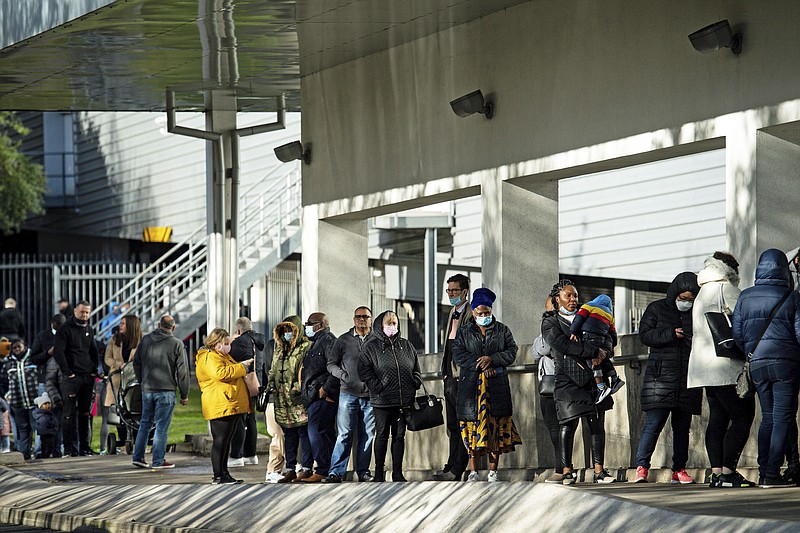LONDON -- Prime Minister Boris Johnson on Monday defended his decision to impose a second national lockdown, brushing aside criticism that weeks of delay have meant thousands more infections and hundreds of needless deaths.
The comments came as Johnson gave the House of Commons details of the proposed four-week lockdown in England that is set to begin Thursday. The plan was hurriedly announced Saturday after updated projections showed that rapidly rising infection rates risked swamping hospitals in a matter of weeks.
"Faced with these latest figures, there is no alternative but to take further action at a national level," Johnson told lawmakers, adding it was right to try imposing local measures first. "I believe it was right to try every possible option to get this virus under control at a local level with strong local action and strong local leadership.″
The new policy comes three weeks after Johnson announced plans for a three-tiered regional approach to combating the virus, with tighter restrictions imposed on areas with higher infection rates. The government chose that strategy in an effort to reduce the economic and social impact of new restrictions, even though a committee of scientific advisers on Sept. 21 recommended a short lockdown as a "circuit breaker" to slow the spread of covid-19.
[Video not showing up above? Click here to watch » https://www.youtube.com/watch?v=f9uFJgCf7_0]
But that approach became untenable after new analysis showed covid-19 was spreading so rapidly that the number of deaths this winter could more than double those recorded earlier this year. The government needs to act now to prevent the National Health Service from being overwhelmed, Johnson said in the face of criticism from members of his own party who are concerned about the impact the restrictions will have on jobs and civil liberties.
Labor Party leader Keir Starmer said the cost of that delay was recorded in statistics of the pandemic. On Sept. 21 the U.K. recorded 11 deaths from covid-19 and about 4,000 new infections. Forty days later, there were 326 deaths and more than 22,000 cases.
"At every stage, he's over-promised and under-delivered," Starmer said of Johnson's covid-19 strategy. "Rejecting the advice of his own scientists over 40 days was a catastrophic failure of leadership and of judgment."
Despite his criticism, Starmer pledged to back the legislation that is expected to come up for a vote on Wednesday.
The U.K. has Europe's deadliest outbreak of covid-19, with 46,943 deaths recorded through Monday.
Under the proposed lockdown, most shops will be closed until Dec. 2, with bars and restaurants restricted to takeout and delivery services. People will be ordered to stay home, except for work, exercise and essential shopping. Schools will remain open.
To cushion the economic impact of the lockdown, the government plans to extend its job furlough program, which covers 80% of the wages of workers whose employers are forced to close by the restrictions. The government on Monday said it would also double support for self-employed workers to 80% of their average trading profits for November. Critics have argued that this group didn't receive enough help from earlier programs.
Under the U.K.'s system of devolved authority, the national governments in Northern Ireland, Scotland and Wales have already imposed tighter coronavirus restrictions than England.
Meanwhile, several other European countries are tightening restrictions this week, starting with a partial shutdown Monday in Germany, as authorities across the continent scramble to slow a rapid rise in coronavirus infections that threatens to overwhelm their health care systems.
[Gallery not loading above? Click here for more photos » arkansasonline.com/113kabul/]
In Germany, restaurants, bars, theaters, cinemas, gyms and other leisure facilities closed in a four-week "wave-breaker" shutdown that seeks to force daily new infections back down to manageable levels.
Austria, like Britain, will follow suit later in the week, closing restaurants, bars and many leisure activities. Italy, Greece and Kosovo also announced new measures. In some places, the new rules -- which vary in strictness -- are prompting violent protests by people frustrated at once again having to forgo freedoms.
In Spain, lawmakers last week approved an extension until May 2021 of the country's state of emergency. The measure puts into place a national nightly curfew and allows regions to impose more localized restrictions, such as limiting movement outside city limits on weekends.
Information for this article was contributed by Geir Moulson and staff members of The Associated Press



